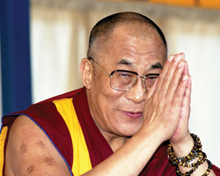Events
October 13, 2010
Religious leaders take an interfaith look at happiness

Are human beings supposed to be happy? What is happiness? How is it achieved and supported, measured or mapped?
The Center for the Study of Law and Religion (CSLR) has been probing answers to these questions during its five-year Pursuit of Happiness Project. Through the lenses of historical, literary and religious texts, and through the rigors of the humane, social and exact sciences, researchers are shedding new light on these ancient questions.
“Originally, ‘happy’ meant ‘fortunate.’ But by Shakespeare’s day it had acquired the sense of personal fulfillment combined with contentment,” says Philip L. Reynolds, Aquinas Professor of Historical Theology at Candler School of Theology who is the project’s director.
Detailed findings about how happiness comes from forgiveness, compassion and living a virtuous life, among other topics, will be published during the next two years in eight new volumes (including “Intelligent Virtue” and “The Bible and the Pursuit of Happiness”) and dozens of journal articles.
In the meantime, CSLR experts have been taking the stage to discuss these concepts with the Emory community and the public at large. On Sept. 21, Patrick Allitt, Emory’s Cahoon Family Professor of American History, challenged the passage in the American Declaration of Independence “that all men…are endowed by their Creator with certain unalienable rights, that among these are life, liberty and the pursuit of happiness.”
“I don’t suppose anyone here actually believes all that,” Allitt said to his audience in Tull Auditorium. “Even less do they believe that they are ‘self-evident truths.’ Surely not: they are highly contentious propositions. At best, aspirations.”
CSLR has asked the world’s most famous happiness expert, His Holiness the XIV Dalai Lama, to lead the project’s capstone event.
At the “Interfaith Summit on Happiness” on Oct. 17, the Dalai Lama will discuss happiness with other world religious leaders: The Most Reverend Katharine Jefferts Schori, the 26th Presiding Bishop of the Episcopal Church; Chief Rabbi Lord Jonathan Sacks of the United Hebrew Congregations of the Commonwealth; and George Washington University Professor Seyyed Hossein Nasr, a distinguished scholar of Islam.
According to the Dalai Lama, happiness is what life is all about. “I believe that the very purpose of our life is to seek happiness. That is clear. Whether one believes in religion or not, whether one believes in this religion or that religion, we are all seeking something better in life,” he states in “The Art of Happiness” (Riverhead Books, 1998).
Including an Asian religion in its spectrum is new for CSLR. “We are purposely widening our faith discussions beyond the West, consulting with the wisdom of the Buddhist tradition and comparing it with the Abrahamic traditions to deepen our understanding of the pursuit of happiness,” says John Witte Jr., Jonas Robitscher Professor of Law and CSLR director.
The debate continues after the summit. At 5 p.m. on Oct. 17, CSLR is hosting “Reception and Reflections on the Summit,” a panel discussion featuring CSLR experts and led by Krista Tippett, host of NPR’s “Speaking of Faith” and “Being.”
The following day, Jefferts Schori, Sacks, Hossein, and The Venerable Matthieu Ricard, a world-renowned Buddhist teacher and author, will present full academic papers on happiness from their respective religious traditions during the one-day conference, “Happiness in Interreligious Perspective.”
